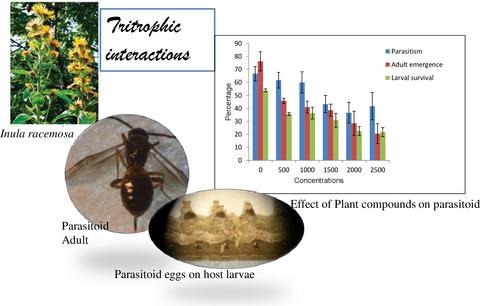当前位置:
X-MOL 学术
›
Entomol. Exp. Appl.
›
论文详情
Our official English website, www.x-mol.net, welcomes your
feedback! (Note: you will need to create a separate account there.)
Biological effects of secondary metabolites of Inula racemosa on the parasitoid Bracon hebetor
Entomologia Experimentalis et Applicata ( IF 1.4 ) Pub Date : 2021-05-10 , DOI: 10.1111/eea.13070 Mandeep Kaur 1, 2 , Isha Saraf 3 , Rakesh Kumar 3 , Inder Pal Singh 3 , Sanehdeep Kaur 1
Entomologia Experimentalis et Applicata ( IF 1.4 ) Pub Date : 2021-05-10 , DOI: 10.1111/eea.13070 Mandeep Kaur 1, 2 , Isha Saraf 3 , Rakesh Kumar 3 , Inder Pal Singh 3 , Sanehdeep Kaur 1
Affiliation

|
Secondary plant metabolites play an important role in mediating interactions among plants, insect herbivores, and their parasitoids. These defensive compounds not only affect the growth and development of herbivores, but also influence their natural enemies. In the present study, the diet-mediated effect of hexane extract of Inula racemosa (Hooker fil.) (Asteraceae) was evaluated on the growth and development of the gregarious ectoparasitoid Bracon hebetor (Say) (Hymenoptera: Braconidae) using a polyphagous pest, Spodoptera litura (Fabricius) (Lepidoptera: Noctuidae), as its host. The influence of various concentrations of I. racemosa extract was recorded on B. hebetor’s parasitization behavior on its host larvae. The parasitism rate of naive female wasps decreased significantly when host larvae were reared on treated diet, but no adverse effect of plant extract was recorded on the viability of eggs. Detrimental effects of the plant extract were also detected in the form of reduced survival and delayed development of the parasitoid. Ingestion of hexane-extract-supplemented diet by S. litura adversely affected the emergence and parasitism rate of adults from the first generation of B. hebetor. In conclusion, consumption of I. racemosa extract by S. litura had a negative impact on various biological parameters of B. hebetor, although lower concentrations of plant extract had no adverse effects. There is a need to study the possible effects of secondary metabolites on these trophic interactions under natural conditions.
中文翻译:

Inula Racemosa次生代谢产物对寄生蜂Bracon hebetor的生物学效应
次生植物代谢物在介导植物、昆虫食草动物及其寄生蜂之间的相互作用中发挥重要作用。这些防御性化合物不仅会影响食草动物的生长发育,还会影响它们的天敌。在本研究中,己烷提取物的饮食介导的效果总状土木香(菊科)(。胡克FIL)中的溶液在群居ectoparasitoid的生长和发育评价茧茧蜂(说)(膜翅目:茧蜂),使用多食性害虫斜纹夜蛾(Fabricius)(鳞翅目:夜蛾科)作为其寄主。不同浓度I的影响。在B. hebetor上记录了总状花提取物对寄主幼虫的寄生行为。当寄主幼虫以处理过的饮食饲养时,幼年雌性黄蜂的寄生率显着降低,但没有记录到植物提取物对卵的活力产生不利影响。还检测到植物提取物的有害影响,表现为寄生虫的存活率降低和发育延迟。S. litura摄入添加了己烷提取物的饮食对第一代B. hebetor成虫的出现和寄生率产生了不利影响。总之,消费一鹃通过提取斜纹夜蛾对各种生物参数的负面影响B.茧蜂,虽然较低浓度的植物提取物没有不利影响。有必要研究次生代谢物在自然条件下对这些营养相互作用的可能影响。
更新日期:2021-07-12
中文翻译:

Inula Racemosa次生代谢产物对寄生蜂Bracon hebetor的生物学效应
次生植物代谢物在介导植物、昆虫食草动物及其寄生蜂之间的相互作用中发挥重要作用。这些防御性化合物不仅会影响食草动物的生长发育,还会影响它们的天敌。在本研究中,己烷提取物的饮食介导的效果总状土木香(菊科)(。胡克FIL)中的溶液在群居ectoparasitoid的生长和发育评价茧茧蜂(说)(膜翅目:茧蜂),使用多食性害虫斜纹夜蛾(Fabricius)(鳞翅目:夜蛾科)作为其寄主。不同浓度I的影响。在B. hebetor上记录了总状花提取物对寄主幼虫的寄生行为。当寄主幼虫以处理过的饮食饲养时,幼年雌性黄蜂的寄生率显着降低,但没有记录到植物提取物对卵的活力产生不利影响。还检测到植物提取物的有害影响,表现为寄生虫的存活率降低和发育延迟。S. litura摄入添加了己烷提取物的饮食对第一代B. hebetor成虫的出现和寄生率产生了不利影响。总之,消费一鹃通过提取斜纹夜蛾对各种生物参数的负面影响B.茧蜂,虽然较低浓度的植物提取物没有不利影响。有必要研究次生代谢物在自然条件下对这些营养相互作用的可能影响。











































 京公网安备 11010802027423号
京公网安备 11010802027423号